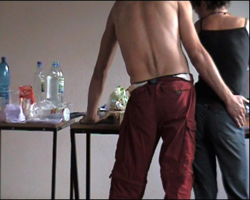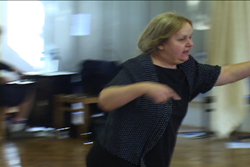DOWNLOAD
PRINT RESOLUTION AND
WEB-READY IMAGES OF THE FOLLOWING TWO VIDEO CAPTURES
19.6 Mb
.exe file (self extracting archive. okay for windows or mac. for mac users
please use stuffit expander.)


THE POWER OF DARKNESS, AFTER TOLSTOY
A Pont
Színház, a Trafó, Kortárs M¦vészetek Háza,
a Massachusetts Institute of Technology, a Mu Szinház, a ROTOR Productions
és TCG / ITI
munkabemutatója
Lev
Nyikolajevics Tolsztoj:
A sötétség hatalma
A magyar szöveget Németh László
fordításának és Jay Scheib
szövegváltozatának felhasználásával
írta Merényi Anna
Pletl Zoltán, Pogány Judit, Scherer Péter, Urbanovits Krisztina, Pereszlényi Erika, Enyedi Eva, Vajna Balázs, Keszég László, Isabelle Lê, Jeremy Morris, Leah Gelpe, Márkos Albert, Merényi Anna, Ken Roraback, Jay Scheib
DOWNLOAD THE PROGRAM NOTES HERE
IN
THE GOLDEN AGE OF COCA-COLA Anisya rat-poisons her terminally ill husband
Peter for the love of Nikita, who sleeps with Everyone, and gets Everyone
pregnant, including his step-daughter Akulina—but when the conniving
mother-in-law steps in to set things right . . . No one will ever be the same.
What happens when beautiful people make monumentally bad decisions? Repeatedly?
Purveyor of the finest in human disasters, Leo Tolstoy turns his hand to the
stage with alarming accuracy, taking us on a joy-ride of love and desire.
Well, it's all fun and games until somebody loses an eye for an eye...
Director and MIT Professor, Jay Scheib, stages this classic of the 19th century
Russian stage as though it had been written this morning. In this hybrid physical-theatre/multi-media
family catastrophe, Scheib offers a portrait of human beings caught inside
of a pressure cooker. Times they are a changing. ——lapstick, humor
and horror, tragedy and satire collide in an eloquent portrayal of our times
through the lens of Tolstoy's masterpiece of modern drama: Power of Darkness.
IMITATION
INTELLIGENCE OR CAUGHT IN THE HOLD OF AN ARTIFICIAL LIFE
or, if the claw is caught the bird is lost...
Tolstoy’s Power of Darkness is a tragedy without royalty, without kings
or princesses. Darkness in the title points dually to Night and to Evil. As
in many Greek tragedies there is a quality of darkness (a general lack of
illumination) a dark spot on the landscape—emanating from this darkness
is a crime. One crime is the mother of a second crime, and another in an ever-mounting
spiral of crimes—crime crime crime until the final crime. Until devastation
can be percieved no more.
This play is about common ordinary individuals caught up in an extraordinary
cycle of opportunistic self-loathing—adultery, theft, murder, sensless
violence, infanticide... But these are not Kings, these are Farmers. They
are workers. Not necessarily bad people—ie they are not hardened criminal
types. These individuals are incapable of seeing the options that exist for
them.
The play was written by Tolstoy in the late 19th century. My interest is in
making the play today—and making it about America. This has a number
of ramifications. The distance between today and the late 19th century is
vast in some ways but many of our concerns have not changed substantially.
Coca-Cola was invented in the late 19th century—and soon will represent
all that is wrong with the insatiablity of global capitalism. Custer’s
last stand took place in the ends of the 19th century and the mass genocide
of the Native American peoples is begun a new chapter—that of the reservation.
This chapter continues—regrettably—to this day. There has not
yet been an apology.
The American Buffalo at the end of the 19th century was brought near to extinction.
They were slaughtered for their pelts and their carcasses were left to rot,
while Native Americans on reservations were forced to starve.
Of course there are many many things happening at that time—the bicycle
is invented as is the phonograph, the Russian Revolution looms on the horizon,
the death penalty in Russia had been recently reinstated, Sigmund Freud publishes
the Interpretation of Dreams, the NAACP is soon founded.... and somehow these
things are clear in the play that Tolstoy has written. It is possible in his
work to sense the movements of the world.
America Today is simply, where to begin? An American taste for tragedy has
blossomed into an ever-growing appreciation for Reality-based television.
In this climate Naturalism has taken some unexpected twists. Strindberg called
it Super Naturalism.
DOWNLOAD
PRINT RESOLUTION AND
WEB-READY IMAGES OF THE FOLLOWING TWO VIDEO CAPTURES
19.6 Mb
.exe file (self extracting archive. okay for windows or mac. for mac users
please use stuffit expander.)

